 Petzlover
Petzlover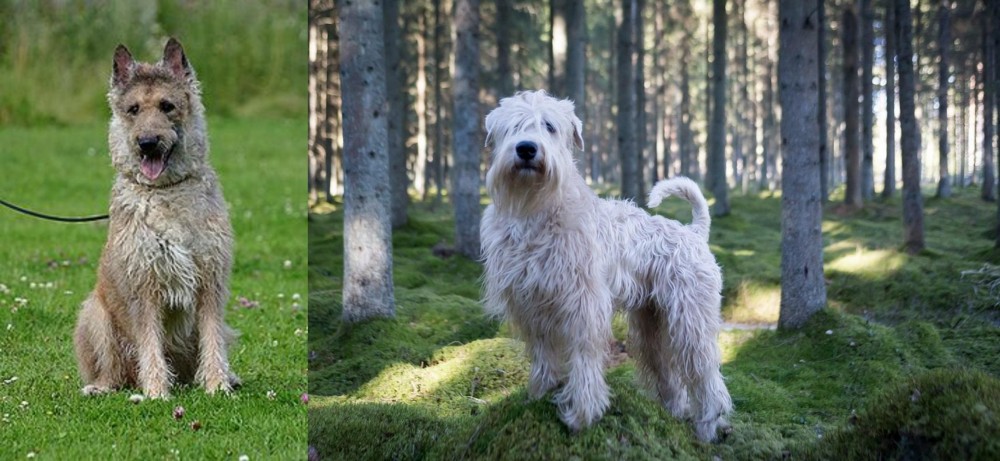 Belgian Shepherd Dog (Laekenois) is originated from Belgium but Soft-Coated Wheaten Terrier is originated from United Kingdom. Belgian Shepherd Dog (Laekenois) may grow 16 cm / 7 inches higher than Soft-Coated Wheaten Terrier. Belgian Shepherd Dog (Laekenois) may weigh 10 kg / 23 pounds more than Soft-Coated Wheaten Terrier. Both Belgian Shepherd Dog (Laekenois) and Soft-Coated Wheaten Terrier has almost same life span. Belgian Shepherd Dog (Laekenois) may have more litter size than Soft-Coated Wheaten Terrier. Belgian Shepherd Dog (Laekenois) requires Low Maintenance. But Soft-Coated Wheaten Terrier requires Moderate Maintenance
Belgian Shepherd Dog (Laekenois) is originated from Belgium but Soft-Coated Wheaten Terrier is originated from United Kingdom. Belgian Shepherd Dog (Laekenois) may grow 16 cm / 7 inches higher than Soft-Coated Wheaten Terrier. Belgian Shepherd Dog (Laekenois) may weigh 10 kg / 23 pounds more than Soft-Coated Wheaten Terrier. Both Belgian Shepherd Dog (Laekenois) and Soft-Coated Wheaten Terrier has almost same life span. Belgian Shepherd Dog (Laekenois) may have more litter size than Soft-Coated Wheaten Terrier. Belgian Shepherd Dog (Laekenois) requires Low Maintenance. But Soft-Coated Wheaten Terrier requires Moderate Maintenance
 The Laekenois, from a variety of 4 Belgian Shepherds, and one of the rarest, is a working- or herding breed of dog which originated in Belgium. It is believed to have been around since the Middle Ages. The intelligent dog was also used for sending messages during the 1st World War. In most countries, all 4 of the dogs are considered the same breed with different varieties in coat types, but there are some instances where they are recognized as separate breeds.
The Laekenois, from a variety of 4 Belgian Shepherds, and one of the rarest, is a working- or herding breed of dog which originated in Belgium. It is believed to have been around since the Middle Ages. The intelligent dog was also used for sending messages during the 1st World War. In most countries, all 4 of the dogs are considered the same breed with different varieties in coat types, but there are some instances where they are recognized as separate breeds.
An interesting aspect of these dogs is that until the advent of dog shows in the 1900s, the 4 varieties were intermixed, and today purebred Laekenois can sometimes give birth to smooth-coated puppies which can be registered as Malinois.
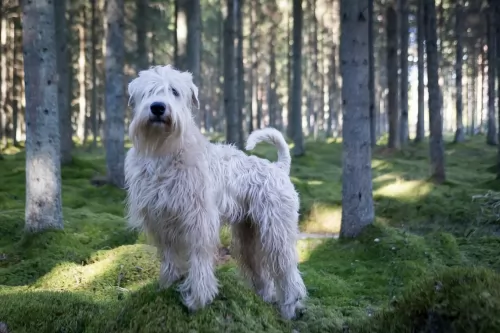 This wheaten colored terrier hails from Ireland. Although the Wheaten has been around for a long time, it was in 1937 that he was recognized as a breed in Ireland.
This wheaten colored terrier hails from Ireland. Although the Wheaten has been around for a long time, it was in 1937 that he was recognized as a breed in Ireland.
The British Kennel Club also recognized the Wheaten and the dog was also exported to the United States. Serious interest started being shown for the Terrier in the 1970s. It was in 1973 that they were recognised by the American Kennel Club.
 The Laekenois is a highly talented dog, highly energetic and extremely intelligent. He will make a superb family pet with owners who are firm and fair with him. The dog is bright, obedient, protective and somewhat territorial. He’ll guard what he believes is his as he is instinctively protective.
The Laekenois is a highly talented dog, highly energetic and extremely intelligent. He will make a superb family pet with owners who are firm and fair with him. The dog is bright, obedient, protective and somewhat territorial. He’ll guard what he believes is his as he is instinctively protective.
He will get on well with children in the home, and he can also be socialized to get on well with other pets in the home. Of course, the way an owner treats the dog, and any other dog for that matter, brings out different temperaments in a dog. To get the best from him he should be trained and socialized from an early age. He will need plenty of exercise if you don’t want him becoming destructive from sheer boredom.
The body is well proportioned, muscular and sturdy. He has an alert, intelligent face with erect ears, bright brown eyes and the nose black. The hair is dense on the long tail, but with no feathering like with the other breeds. The most common color is fawn with a reddish undertone. The chest is deep and the legs strong and straight. The Laekenois's medium length rough, wire coat can include colors from fawn to brownish and black in between.
 The Wheaten is a medium sized dog standing at between 43 and 50cm and weighing between 13 and 20kg both male and female. The coat of the dog is soft, silky and wavy to even curly and is a wheaten to ginger color.
The Wheaten is a medium sized dog standing at between 43 and 50cm and weighing between 13 and 20kg both male and female. The coat of the dog is soft, silky and wavy to even curly and is a wheaten to ginger color.
The coat of the puppy is dark but as he grows up it changes into the wheaten color although the ears may be a dark brown color. Pet owners like that the Wheaten is a very low shedding dog.
Playful, social and friendly, the Wheaten has always been put to good use on the farm. These days he is pet and companion. He is energetic and playful so children love having him around.
He is slightly more hyper and energetic than other Terrier breeds so will require a good dose of exercise.
He is smart and strong willed, and training and socialization turns him into an amicable pet to have around, so much so that he is sought after as a therapy-dog.
They’re easy-going dogs with no aggression issues but they still make great watch dogs and want to do whatever it takes to look after- and protect their human family.
 The Belgian Laekenois is an energetic herding breed dog, and even though he will do well in an apartment if he is sufficiently exercised, big gardens and farms would be first choice for him. Wherever you offer him a home, make sure to exercise him regularly and give him plenty of attention, as he loves his human family.
The Belgian Laekenois is an energetic herding breed dog, and even though he will do well in an apartment if he is sufficiently exercised, big gardens and farms would be first choice for him. Wherever you offer him a home, make sure to exercise him regularly and give him plenty of attention, as he loves his human family.
He’ll make an exceptional watchdog and because he is so intelligent, he learns easily, responding readily to his owner’s instruction. He’ll protect his human family with his life. Social, lively, attractive and bright, anybody who has owned a Laekenois will vouch for his loyalty and devotion, making him a splendid pet.
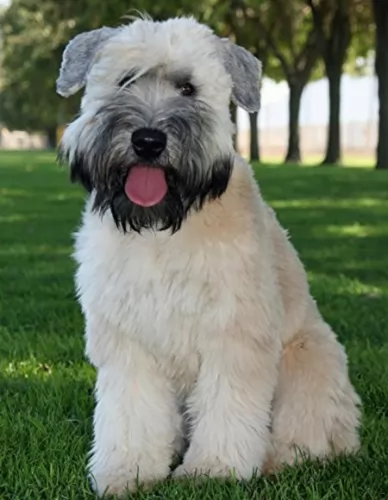 The Soft Coated Wheaten Terrier has always made an excellent farm dog, but today he is more suited as pet and companion.
The Soft Coated Wheaten Terrier has always made an excellent farm dog, but today he is more suited as pet and companion.
He adapts easily to life in the city or the countryside. Wherever he is, he will need his exercise. He also longs to be an active part of his human family, and then he’s happy, lively, social and friendly and is a great playmate for children.
 The lifespan of the Belgian Laekenois is between 10 and 14 years of age, and he is a pretty robust breed, not prone to getting sick easily. However, as with most other dog breeds, he is predisposed to some concerning health conditions.
The lifespan of the Belgian Laekenois is between 10 and 14 years of age, and he is a pretty robust breed, not prone to getting sick easily. However, as with most other dog breeds, he is predisposed to some concerning health conditions.
A frightening health issue in Belgian Shepherds is inherited epilepsy. It occurs in all four varieties. Your dog will have uncontrollable shaking that can last a few minutes. There are many causes of seizures but it is mostly an inherited disorder.
The most common eye disease is cataracts.
This is an inherited disease that causes the joints to develop improperly. He may even have difficulty getting up from lying down.
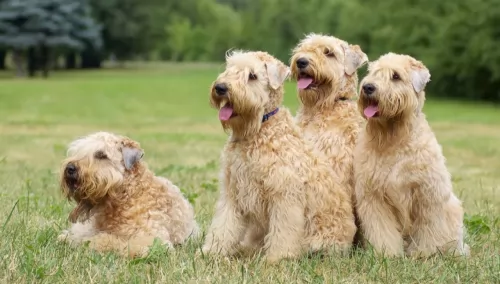 When you bring a Wheaten Terrier into your home, you’re not likely to have too many vet fees as he tends to be a healthy dog breed, being able to reach 13, 14 or 15 years of age with good care.
When you bring a Wheaten Terrier into your home, you’re not likely to have too many vet fees as he tends to be a healthy dog breed, being able to reach 13, 14 or 15 years of age with good care.
Look out for a dog ailment known as Protein-losing enteropathy (PLE). This is a condition where the dog isn’t able to properly absorb protein in the digestive tract, so that it is passed in their stools.
It can be fatal, but if caught early, some dietary changes can keep it under control.
Also, look out for inflammatory bowel disease. This disease occurs when the stomach of the dog has a large number of inflammatory cells which can change the lining of the digestive tract, preventing the normal absorption of food.
 The long, double coat of your Laekenois will need to be trimmed about twice a year otherwise he could look dirty and unkempt. Certainly with the coat he has, you will need to brush him at least twice a week to get rid of all those loose hairs.
The long, double coat of your Laekenois will need to be trimmed about twice a year otherwise he could look dirty and unkempt. Certainly with the coat he has, you will need to brush him at least twice a week to get rid of all those loose hairs.
He is a well muscled, athletic, energetic dog and his food, whether home-made or commercially manufactured, needs to be a high-quality food high in protein and packed full of minerals and vitamins. If you’re not sure about food type, speak to your vet, because as a dog expert, they will advise you on food appropriate to this dog breed and his energy needs. Whether you own a male or female Laekenois, feeding should be such that weight for an adult is maintained around 25–30kg.
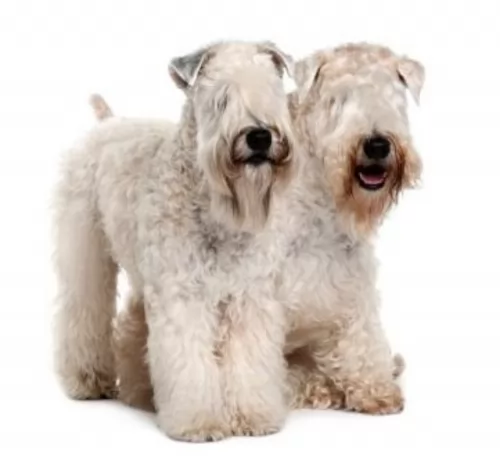 Brush your pet’s silky coat twice a week. Such a silky coat can get all tangled and matted. If you prefer, many people opt to rather have the Wheaten’s coat professionally clipped as then it is easier to handle. They like to have the hair clipped that hangs over the dog’s eyes.
Brush your pet’s silky coat twice a week. Such a silky coat can get all tangled and matted. If you prefer, many people opt to rather have the Wheaten’s coat professionally clipped as then it is easier to handle. They like to have the hair clipped that hangs over the dog’s eyes.
Other grooming tasks require you to check inside his ears for redness which could indicate an infection. Trim his nails and check him over for ticks and fleas.
Have your Wheatie trained and socialized as he is a stubborn dog breed and you want him to be well mannered and obedient.
Terriers like this are energetic dogs and he is going to need exercise every day. A walk for a dog is always a welcome experience as it gives him the opportunity to sniff around and pick up new smells. Play ball- or frisbee games with him as this can tire him out a bit.
If your dog shows signs of illness, get him to the vet. He is such a feisty dog that it can be unbearable to see him out of sorts.
Terriers are energetic dogs so if you feed your dog one of the commercial dog foods, make sure the label indicates what food it is. This is because the foods are manufactured according to the type of dog it is, its age, size and energy levels.
Always try and go for the high quality foods which don’t have all those unhealthy ingredients in them. Try to include some home-made food – nothing exotic and spicy – just plain, wholesome food that won’t upset his stomach.
Boiled chicken, brown rice or pasta and spinach, sweet potatoes and carrots is super tasty and nutritious. You can chop it up and add it to your pet’s kibble twice a week.
Try and include a little bit of raw meat to his diet occasionally as this can go towards ensuring he doesn’t get skin diseases. Always ensure he has a constant supply of fresh, cool water available.